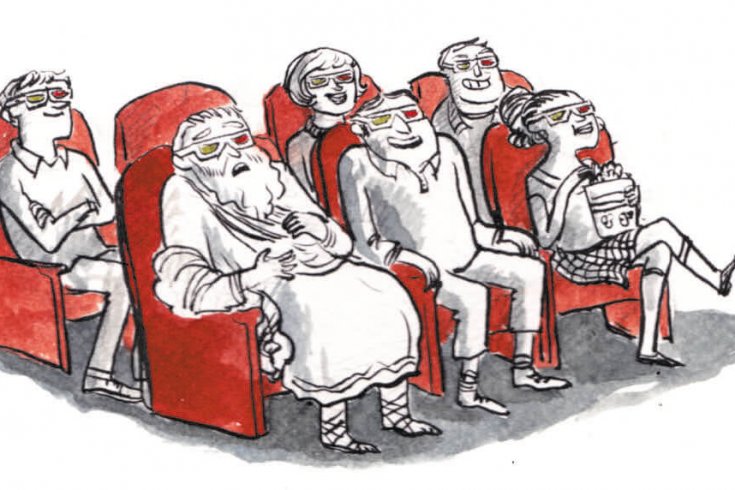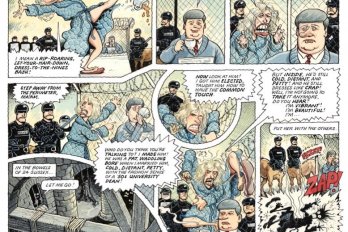Summer slips away, winter approaches, and in the interval the other fall harvest is upon us: new television shows, films, books, music, and video games, most of them trash. I am not misanthropic, but I have decided that the only appropriate response to the vacuous popular culture in which we now subsist is anger or laughter. A few years ago, I found both in a book called A Massive Swelling: Celebrity Re-examined as a Grotesque and Crippling Disease and Other Cultural Revelations, by the American writer Cintra Wilson. I bought copies for friends, one of whom observed that Wilson wrote with a chainsaw. Here, for instance, her description of contemporary Hollywood:
L.A. today is a sad and damaging fiasco, a far cry from the champagne star giddiness of the thirties, when a beautiful girl could hit the Big Time by walking into a soda fountain with no socks. Now there is no counting the miles of hotel sheets a would-be starlet will have to swim through to get a reading for a walk-on part in a sitcom, or the horrible court battles a wannabe jukebox hero will have to endure before he can wrench his own music out of the gnarled grip of insidious bloodsucking industry trolls, or the endless hall of mirrors anybody who wants to work in film will have to break her nose against before she can be a personal boot wiper for “important people.” Everyone in L.A. KNOWS it’s corrupt… It’s the Mexican prison of art… But it’s the only game in town, and if you’re not playing, God help you.
No less angry, but more thoughtful, is Lewis Lapham, the editor emeritus of Harper’s, who taught a writing course at Yale a few years ago in which half the students were, by his definition, illiterate. They had the ability to deconstruct a work like Pride and Prejudice, he says, but the experience would in no way inspire them to read anything else by Jane Austen. Where earlier generations might memorize Latin phrases or quotes from Cicero, they knew the lines from Robert De Niro movies. Lapham places much of the blame on television. As he told journalist Casey Walker in 1998, the camera has shaped our sensibilities, and the camera sees but doesn’t think.
“A plane crash in the mountains of Peru,” he said, “commands the same slack-jawed respect as Mick Jagger in a divorce court, Monica Lewinsky eating Belgian chocolate, cruise missiles falling on Baghdad, Cameron Diaz in gold lame. Because the camera doesn’t know how to make distinctions—between treason and fellatio, between the moral and the amoral, between an important senator and an important ape—its insouciance works against the operative principle of a democratic republic. Such a government requires of both its politicians and its citizens a high degree of literacy, also a sense of history, and, at least in the American context, an ethics derived from the syllabus of the Bible. None of those requirements carry any weight in the Kingdom of the Eternal Now governed by the rule of images.”
We live in a time of rapacious cultural egalitarianism: the people’s choice is ascendant. The noise of the crowd drowns out the voices of erudition, and gives rise to the notion that the arts are elitist and therefore undeserving of government support. The arts have always been a bulwark against ignorance, vulgarity, and savagery. As Baudelaire put it, the more a man cultivates the arts, the less he fornicates—although, personally, I prefer William Hutt, who said that the arts are parklands for the mind, places we go to refresh our sensibilities, our sensitivity to other human beings and other kinds of experience. Never were these parklands as precious as they are today, situated in a brutal landscape in which the lowest common denominator rules.
The issue for governments is not whether the parklands are full—it is my loss if I choose not to go to the theatre—but whether they’re accessible. No taxpayer benefits directly from the expenditure of all his or her tax dollars. Think, for instance, about the money childless couples contribute to public education. But public education benefits society as a whole—and so, we must continue to argue, do the arts. The neglect of the arts in our schools is especially troubling, because there is no better time to inculcate a love of the arts than in childhood; and because the evidence is now irrefutable that students who participate in the arts do better at everything else than those who don’t.
Even metaphoric parklands require care. Francis Bacon, who never witnessed the depravity of Jerry Springer, wrote that “a man’s nature runs either to herbs or weeds; therefore let him seasonably water the one and destroy the other.” Something to think about in weed season.
This appeared in the October 2010 issue.






